“It’s actually a cool story” – An interview with the México WUDC 2018 convenors
Some weeks ago, we interviewed David Alatorre and Montserrat Legorreta, convenors of México WUDC 2018. This week, we can finally present you the results with tons of information – whether it’s about the Masters’ Competition, the Socials, Livestreams, México Open, Triple breaks, Wi-Fi or the IA allocation system. Enjoy!

Convenor David Alatorre – © Asociación Mexicana de Debate
Achte Minute (AM): Hello, you two! Thank you for taking the time to be here. For the start, I’d like to ask you about yourselves. Who are you, what’s your relation to debating and what is your job at the México WUDC 2018?
David Alatorre: My name is David Alatorre, I’m one of the conveners for México WUDC 2018. I also am president of the Mexican Debate Association (AMD). I’ve been the 5th EFL speaker at WUDC and a grand finalist at the Spanish Worlds. I had the honor of founding the first English-speaking debate society in Mexico. At the association, we are implementing debate programmes in Mexico as well as doing consulting for the private sector, and I also teach debating at the Tec de Monterrey Estado de México Campus.
Montserrat Legorreta: My name is Montserrat Legorreta, I’m the other convenor and the vice president of the Mexican Debate Association. I was one of the founders of the high school debating league in 2010, which later became the Mexican Debate Association which we founded and work at. We are dedicated to leading different debate programmes in Mexico and implementing debating in our country as a tool for improving the education system and advancing critical thinking. I debated at two WUDCs, one was Berlin, that was the first one for both of us, and at the Thessaloniki WUDC. At the Dutch WUDC I judged.
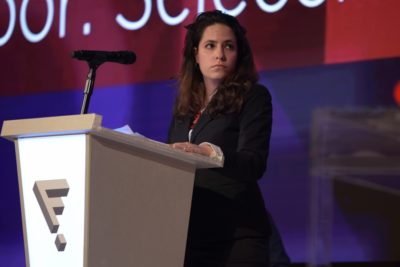
Convenor Montserrat Legorreta – © Asociación Mexicana de Debate
AM: What made you decide you want to host a WUDC?
Montse: It’s actually a cool story. The first time many Mexicans competed at a WUDC was in Berlin. And there we decided that we really wanted to do that someday. We established the association in 2015 and that was when we decided to present a bid in January 2016, when nobody had a bid.
David: It was 2016 when we finally decided. Mexicans like to host large events and I think it’s something that always is the back in our minds: “What would an event look like in Mexico?” But we had the responsibility of bringing debate to Mexico and we were not sure if it was not only the foreign teams benefitting from us investing so much time, money and human resources. But we decided that if we work together with many private and public institutions, it would help spreading it.
AM: In which ways do you think debating, in the country and in the region, will benefit from the event?
Montse: Firstly, it allowed us to make partnerships with many local institutions. For example, Banorte, the largest Mexican bank, is a sponsor and supports spreading debating. We have a very special relationship with Banorte because they believe in what debating does for young people, and the fact that we are hosting the WUDC gives a lot more attention to debating. They launched a campaign called #MexicanosFuertes, which means “Strong Mexicans”, showing people who help to make the country better every day, and we were chosen as the Mexican Debate Association to be in that programme, which gives a lot more visibility to what we do. Also, English is not widely spoken in Mexico, so there is a barrier for creating new teams, since we primarily do debating in Spanish. But the great thing is that many teams have been interested in coming and volunteering, which will be helpful. Also, this will be the first year to have more tournaments hosted in Mexico in the BP format. There are many teams from Chile, Peru, even Spain, who want to come to Worlds and see what the English competitions are like—and it’s a great opportunity, because Mexico is closer to most of them than former WUDCs have been, making it easier to access financially.
David: Especially the volunteers are important, we also have some from Ecuador and Guatemala, who want to learn about organizing an event. They have never had teams at Worlds before. There will also be teams coming from Panama for the first time, so this not only helps in terms of debating in English but also organizing Events. And, of course, about learning more about adjudication etc. The goal of Spanish WUDC is to be as close to English WUDC as possible, but at the beginning they were still somewhat different and this gap will be closing with them learning here. This is also why we want Masters in Spanish, so that they can experience more.
Montse: Also, another idea behind WUDC is that people come together to exchange ideas and forge friendships—which is very fruitful. And lastly, for the country itself, it will be a great opportunity. We want to show people the history, culture and country of Mexico. We want them to see all, so that they can see more than what is usually projected in the news.
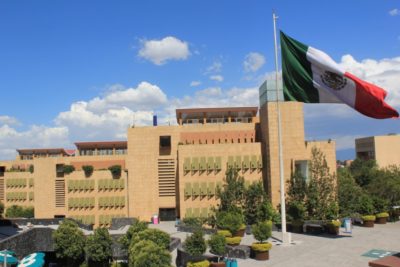
The Tecnológico de Monterrey Campus Santa Fe, where the preliminary rounds will be – © Asociación Mexicana de Debate
AM: Why is the Masters’ tournament in Spanish?
Montse: As David mentioned, we have a language barrier in Spanish and Latin America. Many people didn’t feel comfortable participating in such a large scale tournament in English—even though we did a lot to convince them, many still don’t feel their English is good enough for the WUDC. This sub-tournament within the tournament was usually attractive for some judges, but not for a huge percentage of the participants in general. We decided that we wanted to give people the opportunity to have a chance to debate in Spanish and still be part of the tournament. Also, we wanted to give EPL speakers the opportunity to experience debating in a second or foreign language. And, since Spanish is the second most spoken language in the world, there will also be many participants from foreign countries speaking it—including SPL and SFL speakers. Lastly, it’s a great opportunity for sponsors, since they now can be part of debates and actually understand what’s going on.
David: Yes, many people speak Spanish as their first language, just behind Chinese, and it’s also spoken a lot in the United States. We’ve also been analyzing the participating countries in Masters’ from 2013-2017, and it ranged from 6-14 countries. We will have the same range in Spanish, but all the additional benefits, including having guests who can now understand part of the finals event and experience what debating is. We will also have TV coverage, but they need Spanish parts for that, since only 10% of the Mexicans speak English. It will be very important for the natives and for people from Latin American countries, who can now show something from the Event to their university, their government, etc.
AM: The question we received most often was: Will there be livestreams for people at home, from the preliminary rounds and from the outrounds? Will there be an emphasis on top rooms during the preliminary rounds?
Montse: We are planning on having livestreaming for the entire competition. We haven’t yet chosen which rooms, but livestreams will be available.
AM: Another question regarding media during the tournament was whether you will be putting all content not only on Google and Facebook but also on surfaces reachable in China?
Montse: So, the idea is to feed the website as much as possible, so that people can connect to it easily and get a lot of stuff from it.
David: Earlier this year, some Chinese debaters helped us out reaching for people volunteering etc. via ways usable in China. So our media team is aware of the issue and in contact with some of the top speakers from China.
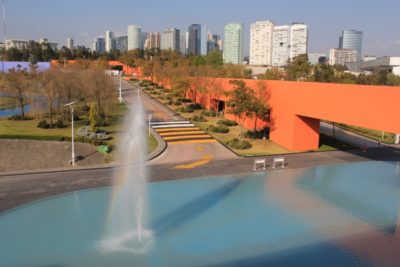
Another view on the Tecnológico de Monterrey Campus Santa Fe – © Asociación Mexicana de Debate
AM: Will there be possible double or triple breaks for EFL/ESL teams? Is that doable with the current schedule?
David: That is a decision that is not for us to make but council. Last year, myself representing Mexico in council proposed having a double break but it didn’t pass. But this year, teams at least have an option to choose which category they want to break if eligible for more than one. So, it is up for council to decide. We could adapt it in the schedule to do double breaks, we have the rooms, but so far, it’s not planned.
Montse: From my understanding of Council procedures it is possible to still change this at pre-Council. We are willing and able to do it, if Council decides to do so, if the decision is made in time. In order for us to plan out the logistics we would have to know before the actual tournament.
AM: What can you tell us about the socials?
Montse: As we said, it’s going to be a great experience for people to experience Mexican flavor. There will be a cocktail for participants at the day of arrival and many surprises. For example, we are planning to use some historic places in the city, which we will announce once confirmed. We are going to have a legendary New Year’s night. There also will be South African night on January 1st, which will also be including Yakka I think. But that’s up to the South Africans to bring it to the tournament. If done so, it will be at the hotel, which will allow us to control the amount consumed so that people are drinking responsibly and safely. And we have McKinsey being part of the gender inclusion night. It’s going to be a tournament that will be remembered for two of the things Mexicans are known for: hospitality and a great party!
David: As Montse mentioned, the venues we have will be some of the most outstanding places in Mexico. We don’t want to spoil the plans of our media team when to announce it, but we are ready to so on social media. We want to make it memorable in many ways. We will also have many Tequila sponsors, one of which already can be confirmed. The opening ceremony which Montse mentioned, will also be hosted by [], which is Mexicans biggest hotel chain. We also want people to experience a truly Mexican New Year’s Eve. It will be a lot of fun and we are very excited.
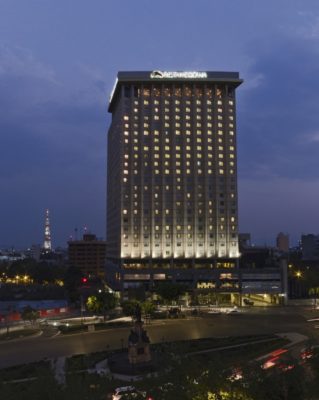
The Fiesta Americana got chosen for accomodation at México WUDC 2018 – © Asociación Mexicana de Debate
AM: A little bit connected to alcohol but also generally a problem is sexual assault. What does México WUDC do about that?
Montse: Well, first all participants will have to sign the code of conduct in advance. And, of course, Mexican law will be consequently applied. We also will speak with Enting, who is part of the WUDC council committee. The idea is to have a reporting mechanism so that people can easily bring complaints or concerns forward. We also have a team especially tasked to care for people’s wellbeing, including room assignments, doing their best to make sure everyone is comfortable and that we take into account the diverse cultural and ideological differences throughout the world in the tournament.
AM: People saw you traveling to major tournaments around the world. What’s the purpose behind that and how is it paid for?
Montse: David travelled to China, the North American Championship and helped CA the first ever tournament in Ecuador. He also went to CMUDE in Guatemala. Another part of our team, Julio Meyer, our Deputy Tournament Director, has been to Europe’s Schools Championship. I have been at the EUDC in Tallinn.
David: I will be participating in many international tournaments in Latin America, but mostly as a CA. Those travels were funded by the universities that hosted the tournaments. At others I am an IA, so I get subsidies. And 0,5% of the WUDC budget is also allocated for outreaching purposes in general.
Montse: Reaching out to the international debating community is especially important for us to get connected to the different debating circuits around the globe – we want to know about their issues, talk to their convenors, learn about best practices. We get a lot of experience from those connections, not only to make WUDC better but to advance the Mexican circuit as well.
AM: David once mentioned a pre-WUDC tournament. Can you tell us more about it?
David: We will be hosting a México Open. We think that due to Mexicans geographic position we believe Mexico is perfect for hosting tournaments both in English and Spanish. Thus, there will be Mexico Open in advance, from December 23rd -27th. It will not be hosted by the México WUDC hosts but another part of the Mexican debate association, the national debate league commission. The participants will go from the hosts of the México Open to the hosts of México WUDC. We can’t confirm the location yet, but it will be a city with really nice weather. It will have a team cap of 80 teams – the idea is to have 40 in English and 40 in Spanish, but if more participants in e.g. English sign up, we will likely redistribute. This event will be during another important festivity, which is noche buena, where we want to reflect those important events in the tournament.
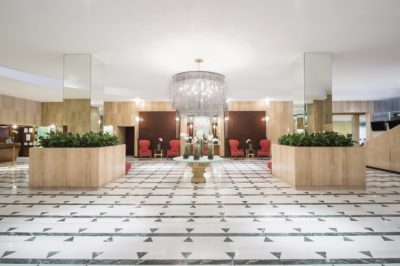
The Fiesta Americana lobby – © Asociación Mexicana de Debate
AM: Can you give us an overview about the IA funding? How much money did so far go to each of the following regions – North America, Latin America, UK, continental Europe, Australia + New Zealand, Asia, Middle East, Subsaharan Africa – and how many people will be attending as IAs from there?
Montse: The general amount is 59000 USD. The process has completely been delegated towards the CA team. Michael and Mifzal can be asked for further detail. It aims for regional diversity, but the whole process is controlled by them. We just give them the money and they distribute it to the applicants. The amount of money is based on the application and need, so people who come from more far away will likely get more funding.
AM: Can you forward them the question, so we can edit the information in?
Montse: I guess we can do that.
Chief Adjudicator Michael Dunn Goekijan: The overall goal of the IA application process is to secure the best possible pool of 100 chairs for the competition. IA applications are anonymised and double marked by two members of the CA team. Applicants are sorted into 5 categories on the basis of this exercise. Typically the top 3 categories will receive funding, that is judges who, on the basis of their anonymised applications, the CA team would be surprised not to see breaking. The amount of funding given increases with the score awarded to a given judge’s application, bearing in mind the cost of travel and alternative sources of funding that judge may have mentioned in their application. In some cases judges are awarded more funding than the above would imply in order to improve the diversity of the pool, for instance on the basis of region.
AM: Will there be free Wi-Fi at the hotel and the venues?
Montse: The university will have Wi-Fi and we also made it part of our contract with the hotel to have Wi-Fi.
David: Actually, the Tec de Monterrey university brought Wi-Fi to Mexico, so they have the technology and know their stuff.
AM: Is there anything else you want to tell our readers?
Montse: This is a great opportunity for Mexico and we want to make it as outstanding as possible, so if you have anything you want to tell us please get in contact and we’ll try to implement it. We have a great team, we can’t wait for you to get to experience the real Mexico and hope to deliver the best Worlds ever. This is an opportunity for all of us to make history together and contribute with what we love to do—debate—in improving the education landscape in Mexico.
David: I’d also have two things: Firstly, the registration is still open, since some teams did not pay. Those can be given either to teams who first cancelled their slot but now decided that they want to come but also for other teams. So if you want more team slots, you can contact us. The second thing is that everyone should feel free to contact us at david [dot] alatorre [at] wudc2018 [dot] mx and montserrat [dot] legorreta [at] wudc2018 [dot] mx . Of course, you can also reach us on Facebook.
AM: Ok, so there is one more question from the community, although it’s rather supportive. I quote: “Why is David so damn hot <3?”
David: People can feel free to reach out on Facebook and I will answer them personally. *laughs*
Conducting the interview was Lennart Lokstein.
Mittwochs-Feature: Every Wednesday the Mittwochs-Feature features an idea, interview or book regarding debate – usually in German, sometimes in English, sometimes both. If you would like to do a feature regarding a certain topic please mail us your idea to team [at] achteminute [dot] de.






